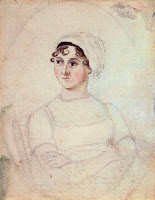Writing Spaces
Jane was wise,
careful not to learn housework,
so much not to be trusted
with laundry and preserves and polish
the family only tolerated her
sometimes making tea.
How long-sighted to
claim little space,
a desk in the parlour's corner,
a shelf for ink and paper,
a shawl to cover up
when guests came to chatter
and in that pool of quiet
where floorboards creaked
as light fell from the casement
to conjure, unnoticed, characters whose influence
out-classed, beyond all expectation,
the domestic boundaries of her world.

Virginia was right,
no artist ought to have to work
without at least a room,
some private space
in which to escape
unwelcome intrusion.
Unlike her sister, Jane,
she claimed her rightful space,
though subject to circumstance,
adept at moving house,
at each enforced upheaval
unafraid to take bold ownership.
When playing hostess she withdrew at will
gripped by an intense, internal quest
for solitude, yearning for room to explore
layered meanings of minutiae
that build to life's crescendos
and wind down to river's depths.
Florence was known
for nursing dying men,
challenging their superiors
armed with statistics
worked up at dead of night
in lamplight by her bed.
Her life divided into parts -
active beyond what's healthful
then a homebody for decades,
her calculation, writing, campaigning
too often dismissed as invalid -
interference by a lady invalid.
Not possible to prove
the need for sanitation
or write a theological treatise
eight hundred pages long
without a home, a private couch,
her own day's-end closed door.

Clara was entrancing
on stage and in the parlours
of wealthy patrons
bringing to birth sonatas,
wrestling orchestras to submission
beneath grand concert hall ceilings.
Abandoning this for home,
nursery and eight children
she wrote modestly,
constrained by constant duty,
her husband paying tender tribute
to the loss of so profound a talent.
In the shadow of a husband's
prodigious output,
her own music neglected
in favour of glittering performances,
she composed an accomplished body of music
whose power still grows today.
©Janet Henderson 2018
Jane Austen and Virginia Woolf found or made the opportunity to use their creative genius to the full. It is less well known that Florence Nightingale wrote a unique and systematic theological treatise, part of which deals with the problem the theodicy (suffering). It deserves recognition in that she brings her perspective as a nurse to a problem that had, at the time, seldom been written about by women. She lacked opportunity to develop her theological thinking. In the blogpost above this one, you can listen to Francesco Nicolodi playing the fourth movement of Clara Schumann's Piano Concerto, Op. 7 in A minor. Judge for yourself whether Robert Schumann was right when he wrote, 'Clara has composed a series of pieces which show a musical and tender ingenuity such as she has never attained before. But to have children and a husband who is always living in the realm of the imagination does not go together with composing. She cannot work at it regularly and I am often disturbed to think how many profound ideas are lost because she cannot work them out.'








Comments
Post a Comment